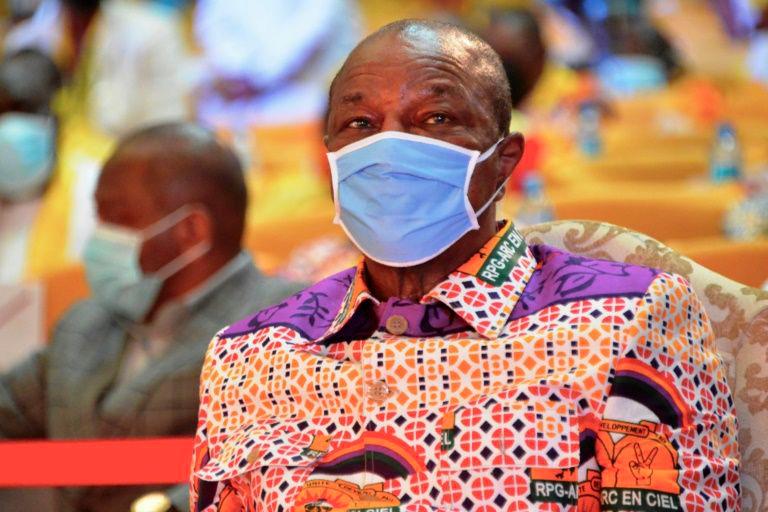CONAKRY: Guinean President Alpha Conde has urged his base to rally behind him in next month’s election, where he is controversially seeking a third term, referring to a “war” between his government and the embattled opposition.
Voters go to the polls on October 18, where 11 candidates are contesting Conde’s leadership of the West African state.
The 82-year-old president is running after pushing through a constitutional referendum this year which reset the two-term presidential limit to zero.
But Conde’s recent combative campaign speeches have attracted accusations of stoking ethnic tensions in the polarised nation of some 13 million people.
In one such speech broadcast Tuesday evening, Conde warned that “this election is not just an election, it’s as if we were at war”.
“The other candidates have formed a bloc to fight me,“ he said in the Malinke language, referring to an agreement between opposition candidates to highlight credibility issues in the election.
Conde normally speaks French during official national addresses.
On Saturday, Conde also warned voters in a speech not to back an opposition Malinke candidate, for example, arguing that this would amount to a vote for Cellou Dalein Diallo, from the leading opposition party UFDG.
“You haven’t forgotten what happened after the death of Sekou Toure,“ Conde said on Saturday, referring to instability following the death of Guinea’s first president in 1984, when looters targeted Malinke homes.
Guinea’s politics are mostly drawn along ethnic lines. President Conde’s party is largely backed by Malinke people, and the UFDG by Fulani people, although both insist that they are pluralist.
Lawyers for the anti-Conde coalition FNDC warned the International Criminal Court in a letter Tuesday that Conde’s statements risked unleashing ethnic violence.
“These statements reflect Mr Alpha Conde’s desire to shift the debate to the ethnic arena with the risk of fuelling divisions within the population,“ the letter said.
“These factors make us seriously fear new electoral violence with an ethnic flavour,“ it added.
Authoritarian drift
Conde became Guinea’s first democratically-elected president in 2010, and won re-election five years later.
Despite initial hopes of a new political dawn in the country, rights groups have accused the octogenarian leader of drifting into authoritarianism.
His bid to run for a third presidential term has aroused particular criticism.
An anti-Conde coalition called the National Front for the Defence of the Constitution (FNDC) argued that the plan for a new constitution was a Trojan horse to allow Conde to extend his grip in power, for example.
The FNDC led rolling protests against that possibility from October last year, but security forces cracked down and several dozen people were killed in the following months.
Conde went on to win the March 22 referendum — which had been delayed weeks earlier after observers found 2.5 million unverifiable voter names on the electoral roll — with 91.59% of the vote, according to the official results.
At least 10 people were killed during unrest on polling day, according to the FNDC.
Electoral roll
There have also been growing suspicions about the credibility of Guinea’s electoral roll — a perennial source of the contention in the country.
Guinea’s electoral authority on September 14 released voter-distribution data which appeared to show anomalies that would benefit Conde.
Some towns in the president’s strongholds in the east showed spikes in the number of registered voters.
After opposition criticism, Souleymane Keita, an MP for Conde’s RPG party, said that “strong migration” to regions rich in gold and diamonds explained the increase.
On Wednesday, Francis Behanzin, the head of a group of experts from the West Africa bloc ECOWAS sent to audit Guinea’s electoral roll, said that it “is of sufficient quality for the next elections”.
Some 5.4 million voters are registered for the poll, he added. — AFP










